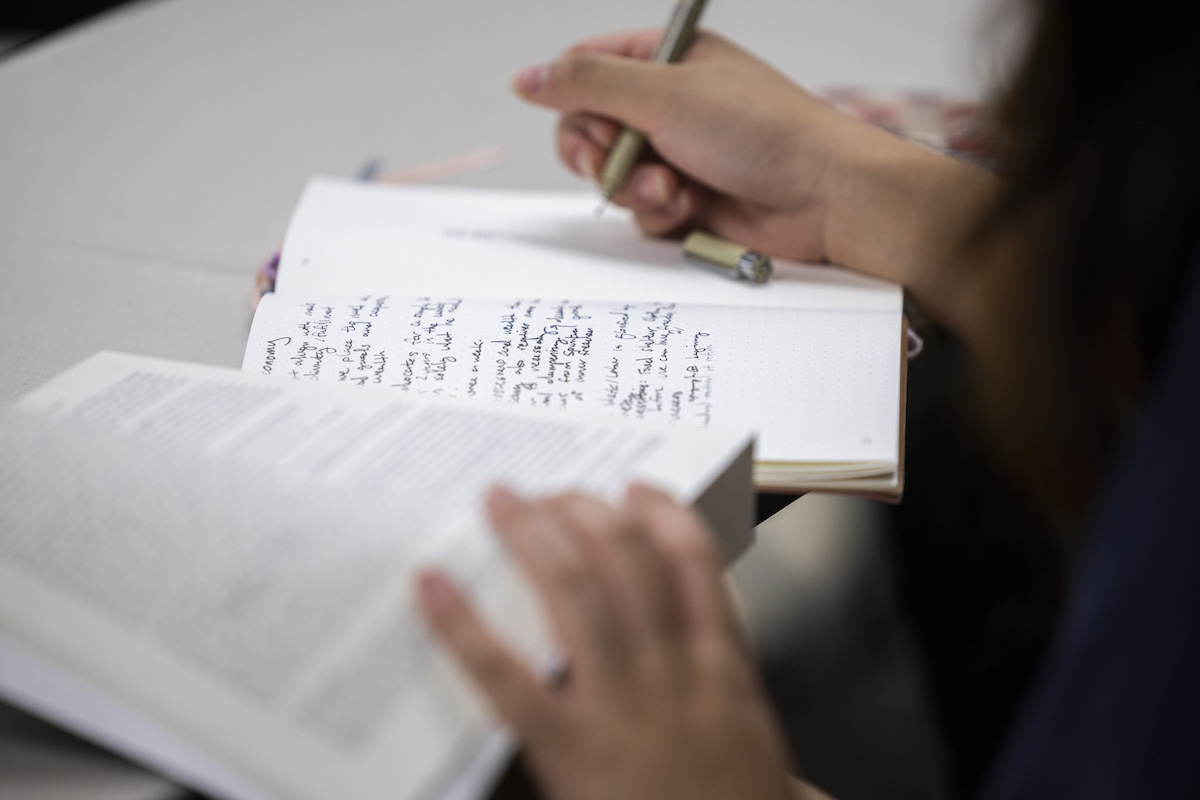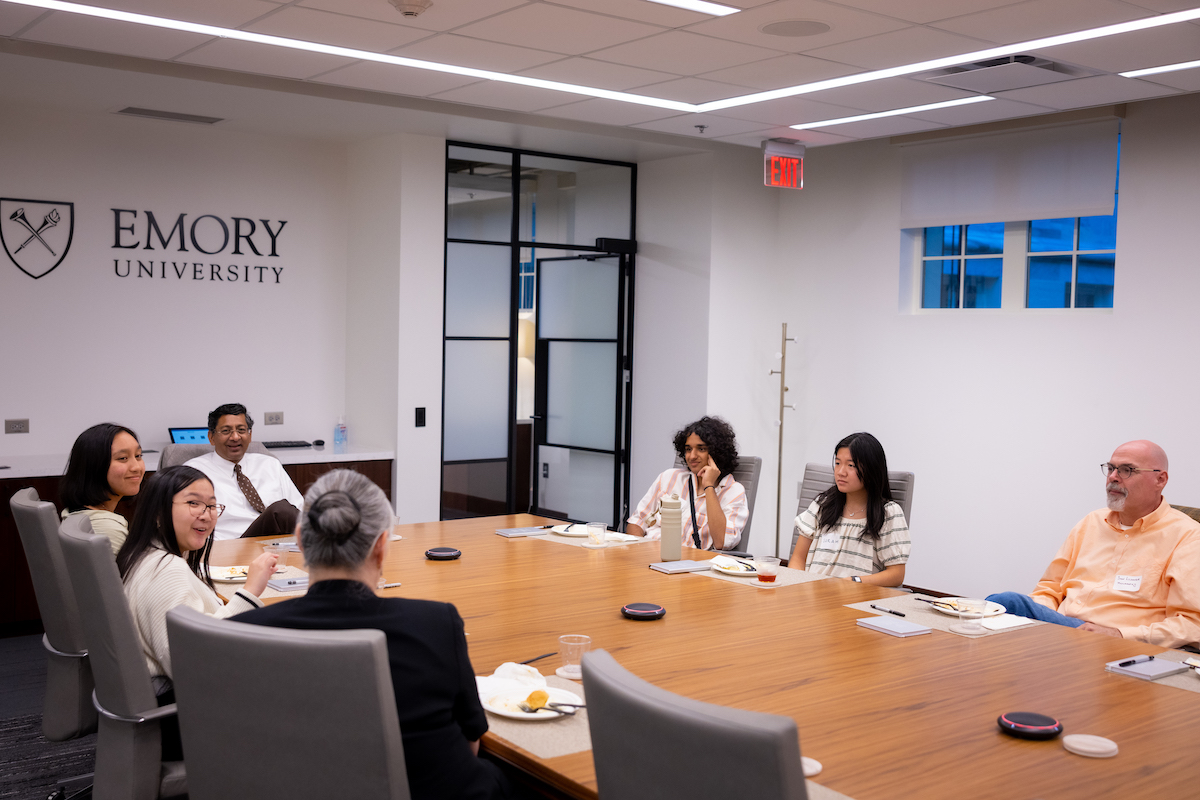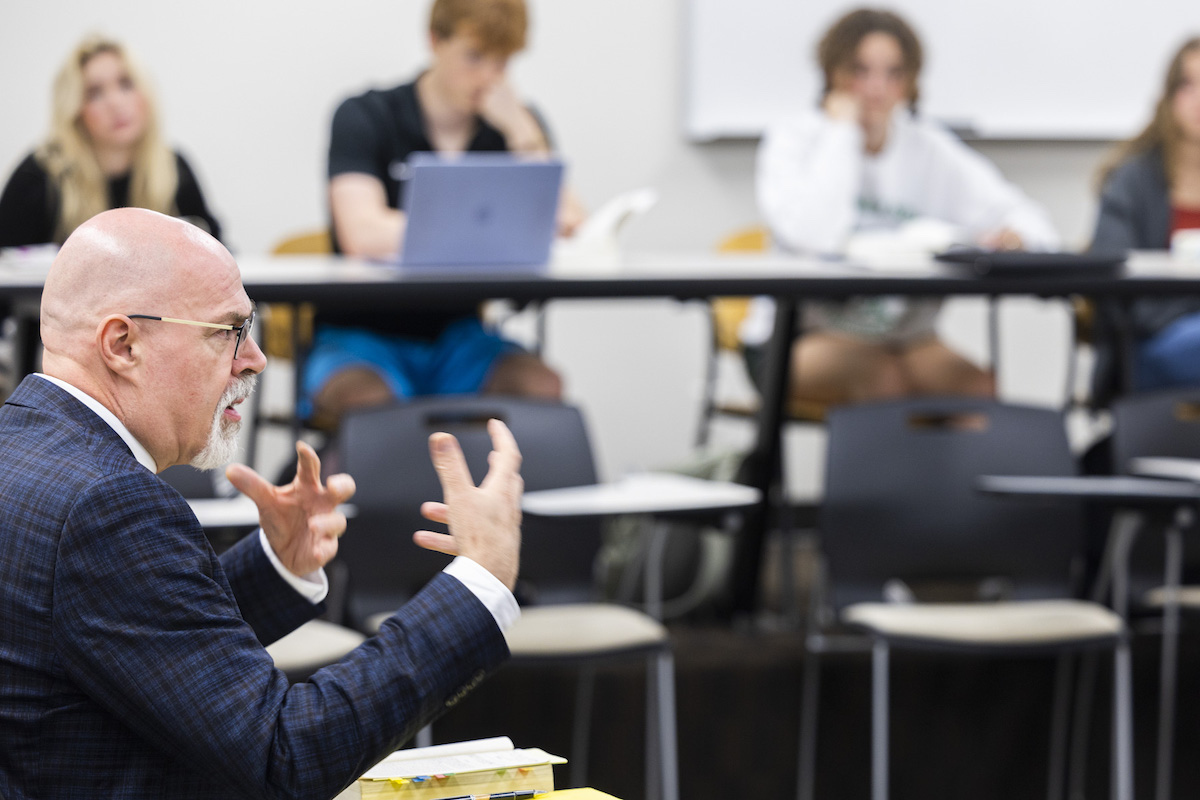Imagine being part of an Emory course where “you are the content.” In your very first semester.
That’s the promise behind 10 flourishing seminars being piloted as part of the First-year Seminar program in Emory College of Arts and Sciences. Following Provost Ravi V. Bellamkonda’s introduction of student flourishing as an overarching theme a year ago, the university has sought ways to deepen Emory’s legacy of preparing students to think critically, act ethically and work collaboratively.
“Student flourishing embraces the full arc of students’ lives and offers experiences designed to foster personal and professional success,” says Bellamkonda, provost and executive vice president for academic affairs. “In these first-year seminars, students will come to understand flourishing through different modes of thinking and being, suggesting the wide range of paths that lead to meaningful outcomes.”
An innovative partnership between the Office of the Provost and Emory College of Arts and Sciences, the flourishing seminars “seek to not only deepen what students know but also who they aspire to be,” says faculty member John Lysaker.
As the William R. Kenan Professor of Philosophy, Lysaker is, in many ways, the ideal chief architect for this project. Well respected among faculty and an admired teacher, he is someone whose discipline provides insight into thriving. Lysaker will be teaching a course — Flourishing, or “The Good Life” — which will ask students to interrogate: How does your flourishing relate to the flourishing of others, including more than the human world?
“Traditionally, students follow two paths: making sense of the discourse of their lives and the discourse of their courses. Those tend to be fairly separate. For a philosopher like myself, that is a failure. Philosophy speaks to the voice we use to orient ourselves in the world. That is true of a liberal arts education all the way to its roots,” says Lysaker.
In the case of Emory students, Lysaker acknowledges starting from a position of strength. “We say ‘liberal arts,’ and we presume students know how to do it. Mostly, they do. The students who come here are unbelievable. But why not give them, early on, some key concepts that can travel through their years of undergraduate study and invite them to discover other concepts?” asks Lysaker.
What makes the courses tick, individually and together
Each course offers a multidisciplinary approach and an opportunity for students to apply what they learn to their own lives. Already inherent in these courses, which predated the pilot, were three concepts germane to flourishing.:
- Flourishing is accomplished through connection. The courses acknowledge, some more explicitly than others, that one of the principal conditions for flourishing is a capacity for justice — for seeing, as Lysaker says, “that some people face a steeper climb in one or more dimensions as they seek connection.”
- Attaining “liberal arts literacy” requires establishing connections between courses. Students in the seminars will gain this experience as each course looks outward to two other courses in the cohort.
- Each course is, in some sense, “about” the student. Students will be encouraged to reflect on how the course’s subject matter bears upon their well-being.
In The Science of Study, Andrew Kazama vows — tongue partially in cheek — that he will encourage his students to “absorb their courses like amoebas and make them their own, building a better version of themselves.” A student takes notes in Lysaker’s class, which will examine the theme of “connections” in sociocultural, economic, ecological and interpersonal terms.
The colorful metaphor stems from Kazama’s background in animal behavior and neuroscience; he earned a PhD in psychology from Emory in 2010. He serves as director of undergraduate research, psychology lecturer and research associate at the Emory National Primate Research Center.
Kazama considers the courses to be “about so much more than the content they cover; they are also training students to think in particular ways. It’s the diversity in thought processes and the ability to tackle a problem from multiple viewpoints that lead to innovative thinking but also intellectual humility.”
The Science of Study will cover ways to optimize study and performance by covering the history of learning and memory principles as well as understanding how to evaluate peer-reviewed literature.
Both Kazama and Lysaker emphasize that “liberation” stands at the heart of liberal arts. According to Lysaker, “Liberal arts is an education in how to meaningfully exercise your freedom.”
Kazama adds that a willingness to role-play is key: “In these seminars, students will have the ability to ‘think’ like a philosopher, or an artist, or a neuroscientist using whatever approach/discipline suits that particular problem.”
A feast of thought, and dinner is served
Kazama’s students will interact with the classes for Buddhism and Human Flourishing as well as The Power of Storytelling. For the former, students will band together for a morning waterfall meditation in Lullwater followed by a discussion of Thích Nhất Hạnh and the science of mindfulness meditation. In association with the storytelling course, Kazama’s class will share a story-circle exercise followed by a discussion on how stories can be used to memorize and store large amounts of information.
Robyn Fivush and Kim Loudermilk co-teach the storytelling course. Fivush is Samuel Candler Dobbs Professor of Psychology and director of the Institute for the Liberal Arts. Loudermilk is director of the Undergraduate Program in American Studies and IDEAS Fellowship as well as senior lecturer. Both have worked effectively with Kazama previously through the LINCed program and welcome this new take on interdisciplinarity.
“Beyond our exploration of the world of stories — which connect us, transform us and allow us to express our deepest understanding of ourselves and the world — we look forward to partnering with the other seminars to better understand personal flourishing and scholarly perspectives from other subject areas that also touch on the human condition,” says Loudermilk.
The first of the weekly dinners associated with the flourishing seminars attracted Provost Bellamkonda.
“If you are a biologist, you call what we are assembling through these dinners an ‘ecology.’ If you are an engineer, it is a ‘network.’ By any definition, it is an opportunity. Emory’s leaders and faculty are deeply invested in the welfare of our students, and their presence at these dinners will be one manifestation of that care,” notes Lysaker.
Perhaps most intriguing, students will be asked to write a letter to their future self about what that self needs to know in order to flourish. The letters will be gathered anonymously and archived but also will be sent to the students in the middle of their junior year. That is known to be a turning point in undergraduate careers, the time students decide how to spend the next years of their life.
“The flourishing seminars and their accompanying dinners model the kind of educational experience we are intent for all students to have at Emory, combining deep intellectual engagement, self-reflection and nourishment. Our faculty are as excited as our students to convene meaningful discussions and deep exploration of ideas and to extend these from the classroom to the dining table,” says Freeman.
“I see the flourishing seminars as among our newest and most exciting rituals in Emory College and am thrilled by the range of topics and breadth of disciplines represented this year. I expect these to flourish and become a defining feature of the first-year experience,” she adds.
Advisers in the Office of Undergraduate Education indicate that the lineup of flourishing seminars has students motivated to begin. Their formal responses, once the semester ends, will be measured in two ways, according to Heather Mugg, associate vice provost for undergraduate affairs. “At the course level, we will seek students’ feedback; there also will be a section of the ECS 101 survey, required of all first-year students, that covers the flourishing seminars,” says Mugg.
Lysaker hopes the seminars are expanded in subsequent years and, to him, that does not just mean broadening access but also allowing them to grow and change. As he notes, “If something is good, it should inspire meaningful succession and innovation.”
Fairytales and Flourishing (French) The Power of Storytelling (American Studies) The Science of Study (Psychology) Flourishing, or "The Good Life" (Philosophy) Human Flourishing: Imagine a Just City (Biology) Buddhism and Human Flourishing (Religion) Economics of Systemic Racism (Economics) Nonhuman Flourishing (Comparative Literature) Contemplate, Debate, Create (Dance) Happiness and Human Flourishing (Philosophy)The Courses

